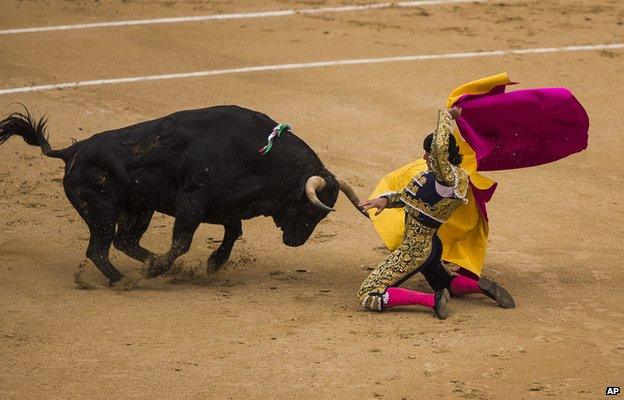Who, What, Why: How dangerous is bullfighting?
- Published

The prestigious San Isidro bullfight has been suspended after three matadors were gored in one day. This is actually rarer than the uninitiated might expect - it's the first suspension for 35 years. So how dangerous is bullfighting, asks Tom de Castella.
Bullfighting is a "supremely dangerous art", says Garry Marvin, professor of human-animal studies at Roehampton University. "If a normal person got into the ring with a fighting bull, I'd expect them to be severely gored or dead in a few moments." Matadors are highly skilled, however, and may go several seasons without injury.
What do the figures say? Bullfighting in Spain is run by the Ministry of Education, Culture and Sport - but surprisingly no statistics on injuries are kept. Some unofficial figures do exist, however. In the 2013 season, 31 matadors received horn wounds, external, according to the datoros.com website. Some were minor, some life-threatening. As well as the matadors themselves, 16 of their assistants were injured, external - the assistants usually include "picadors" on horseback, "banderilleros" on foot, and a sword page.
These 47 injuries occurred during a total of 661 bullfights in Spain in 2013, external (the ministry does count how many bullfights take place).
The profession is less perilous than it was, thanks to advances in medicine. The invention of penicillin helped, and today at big bullrings specialist surgeons are on standby to operate. The last Spanish matador to die was Jose Cubero Sanchez "El Yiyo" in 1985. Alexander Fiske-Harrison, author of Into The Arena: The World of the Spanish Bullfight, cites records showing that 533 professional bullfighters have been killed in Spain since 1700. However the records may be incomplete, he says, as bullfighting has only been regulated for 100 years.
When matadors are hurt, the injuries can be gruesome. In October 2011, Juan Jose Padilla was blinded in one eye, external by a horn. He was back six months later. Worldwide, the last matador to die was Colombian Jose Eslava Caceres, who was trapped against boards at the edge of the ring in 1987, and suffered a fatal piercing of the lung.
While the matador is there by choice, the bull is not. It dies every time, apart from rare occasions where both bull and matador perform exceptionally well. In these cases, the bull's life is spared.
Follow @BBCNewsMagazine, external on Twitter and on Facebook, external